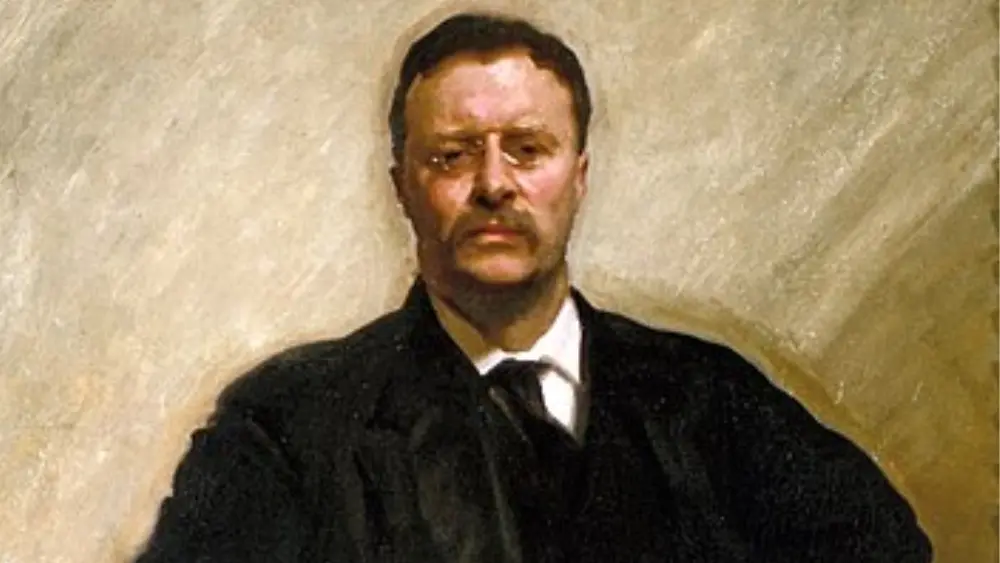Theodore Roosevelt, born on October 27, 1858, in New York City, was one of the most vibrant and impactful figures in American history. Serving as the 26th President of the United States, he reshaped the nation with his bold ideas and actions. Roosevelt was known for his progressive reforms, dedication to conservation, and fierce advocacy for social justice. His legacy continues to inspire and shape the country’s political and social landscape.
Early Life and Education
Theodore Roosevelt’s early life was marked by both privilege and adversity. Born into a well-off family, he faced considerable health challenges during his formative years. These difficulties, however, did not deter him. They fueled his determination, leading to a remarkable blend of intellectual pursuits and outdoor activities, overcoming obstacles along the way. During his early years, Roosevelt’s character was shaped, showing resilience and commitment to personal growth.
Roosevelt’s journey continued at Harvard University, where his intellectual curiosity and passion for natural history truly began to flourish. His Harvard years marked self-discovery, immersing in academia while exploring the outdoors, shaping his pivotal journey of growth. This period laid the groundwork for his future accomplishments, shaping the dynamic leader and statesman he would become. Theodore Roosevelt’s early life and education exemplify adversity’s transformative power, fostering personal growth and self-discovery amid challenges.
Theodore Roosevelt: Ranching and Western Adventure
In 1884, Theodore Roosevelt’s life turned poignant. He lost his wife and mother on the same tragic day, altering his path. Seeking solace and a fresh start, he embarked on a bold adventure, marking a defining chapter in his life’s story. Roosevelt journeyed to the Dakota Badlands, a remote and unforgiving region of the American West. Here, he also found solace and ran a cattle ranch, fully embracing the rugged frontier lifestyle, exceeding mere refuge.
His time in the Badlands changed him in ways that lasted a lifetime, sparking a deep love for the outdoors and the raw beauty of the wilderness. What began as a way to escape the pressures of his life soon became a transformative experience, shaping Roosevelt’s character in profound ways. There, he developed a fierce determination, resilience, and a sense of grit that would define his presidency. His time ranching in Dakota wasn’t just an escape—it became a pivotal chapter in both his personal journey and the nation’s history, one that fueled his lifelong commitment to conservation and protecting the environment.
Theodore Roosevelt’s Political Ascent
Roosevelt’s political journey started in the NY State Assembly, making him a passionate advocate for progressive reforms from the beginning. During his tenure in the assembly, he passionately championed causes like civil service reform and regulatory legislation. Early political ventures showcased Roosevelt’s commitment to public service and his strong belief in the government’s power to bring positive societal change.
Roosevelt’s rise in politics happened quickly, driven by his charisma, boundless energy, and strong belief in reform. His commitment to public service and his relentless drive to create change quickly brought him into the national spotlight. He was never afraid to take on tough issues or challenge powerful interests, and these qualities became the hallmark of his career, setting the stage for a presidency that would reshape the country. His early political efforts laid the groundwork for an incredible journey of leadership and reform, leaving a lasting impact on America.
Assistant Secretary of the Navy
In 1897, Theodore Roosevelt received a significant appointment that would shape the course of his political career. McKinley chose him as Assistant Secretary of the Navy, a role of immense strategic significance in Roosevelt’s career. In this role, Roosevelt ardently advocated for a robust navy’s development, recognizing its vital role in safeguarding American interests globally.
Roosevelt’s foresight and advocacy for naval preparedness would be put to the test during the Spanish-American War in 1898. His effective management and forward-thinking policies helped to position the U.S. Navy for success in the conflict. The resounding win at Santiago de Cuba elevated Roosevelt’s reputation as a capable leader, earning him national acclaim and recognition. This pivotal career chapter became a stepping stone to more significant roles in American politics and leadership for Roosevelt.
Theodore Roosevelt: The Rough Riders and Spanish-American War
Theodore Roosevelt’s remarkable journey during the Spanish-American War of 1898 exemplifies his fearless and adventurous spirit. Fueled by his desire for hands-on involvement in the conflict, he made a pivotal decision to resign from his position as Assistant Secretary of the Navy. Instead, he sought to lead the “Rough Riders,” a volunteer cavalry unit composed of diverse individuals from various backgrounds and regions. This decision was emblematic of Roosevelt’s courage and his determination to contribute to the war effort in a meaningful way.
The Rough Riders’ moment of glory came during the Battle of San Juan Hill in Cuba, where their valor and resolute leadership under Roosevelt’s command played a crucial role in the American victory. This engagement catapulted Roosevelt to national hero status, as he became renowned for his fearless charge up San Juan Hill. This significant military achievement became a defining moment in his political career, boosting his reputation as a charismatic and fearless leader. It ultimately propelled him to the presidency and marked the beginning of his remarkable legacy in American history.
Governor of New York and Vice President
Theodore Roosevelt’s political journey continued to ascend as he transitioned from his role as a war hero to the Governorship of New York. Elected in 1898, he quickly made a name for himself as a progressive leader, enacting various reforms and earning a reputation as a champion of the people. His progressive policies and his unwavering commitment to social and economic justice propelled him into the national spotlight.
However, it was in 1901 that Theodore Roosevelt’s trajectory took an unexpected turn. Following his re-election as Governor of New York, he received a profound and life-altering promotion. Later that year, the assassination of President William McKinley elevated Roosevelt to the Vice Presidency of the United States. Little did he know that this twist of fate would mark the beginning of a transformative era in American politics, as McKinley’s tragic death thrust him into the presidency.
Theodore Roosevelt: Progressive Reforms as President
Theodore Roosevelt’s presidency was marked by a fervent commitment to progressive reforms that aimed to address the pressing issues of his time. One of his most notable endeavors was trust-busting, where he took on large and powerful corporations to ensure fair competition in the marketplace. Roosevelt’s dedication to consumer protection was evident in the passage of significant legislation, including the Pure Food and Drug Act and the Meat Inspection Act. These groundbreaking laws were instrumental in safeguarding the health and well-being of the American people by regulating food and drug quality and ensuring the safety of meat products.
Furthermore, Theodore Roosevelt’s legacy in conservation and environmental protection remains unparalleled. He expanded the national parks system, setting aside vast tracts of land for the enjoyment and preservation of future generations. His efforts in natural resource conservation protected America’s natural treasures and laid the groundwork for the modern environmental movement. Additionally, Roosevelt’s presidency stands as a testament to his unwavering commitment to addressing social, economic, and environmental issues. His progressive policies continue to shape the nation’s governance and priorities today.
Foreign Policy and Diplomacy
Theodore Roosevelt’s approach to foreign policy was characterized by a popular motto: “Speak softly and carry a big stick.” This encapsulated his belief in diplomatic negotiations backed by the credible threat of military power. It reflected his commitment to assertive diplomacy while ensuring that the United States maintained the capability to protect its interests and enforce its policies.
One of the most important accomplishments of Roosevelt’s foreign policy was his role in mediating the Russo-Japanese War. His efforts led to the Treaty of Portsmouth in 1905, which successfully ended the conflict. For his work in negotiating peace, Roosevelt became the first American to be awarded the Nobel Peace Prize. This achievement boosted his reputation as a skilled statesman. It also highlighted America’s rising influence and leadership in international affairs.

Theodore Roosevelt: Legacy and Impact
Roosevelt’s presidency, with progressive reforms like trust-busting and consumer protection, set a federal precedent in addressing social and economic issues. His steadfast conservation commitment preserved vast landscapes and created the national parks system, ensuring future generations could cherish these treasures. Additionally, his vision of America as a global power, seen in the “speak softly and carry a big stick” policy, reshaped its international role.
Roosevelt’s policy success, charisma, and dynamic leadership greatly influenced future leaders and the American psyche. He pioneered using the presidency as a “bully pulpit,” passionately advocating for causes and rallying public support effectively. Theodore Roosevelt’s larger-than-life persona still captures the imagination of many. His fearless approach to tackling the tough issues of his time continues to inspire both leaders and everyday citizens. His legacy is far more than a historical footnote. It serves as a powerful reminder of how one person’s vision and determination can shape a nation’s future. Roosevelt’s life and leadership still echo in America’s identity today.











